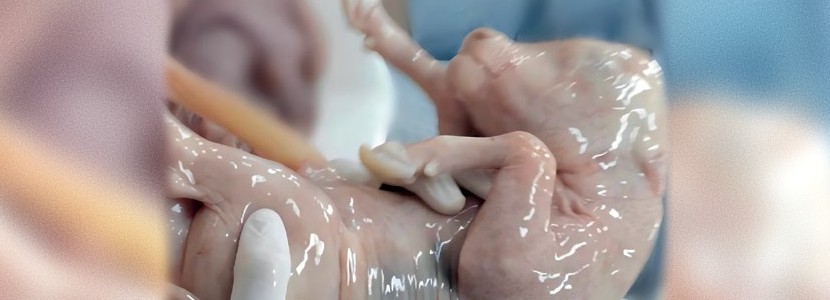 08 Mar 2022
08 Mar 2022
Fetal programming is an important aspect in high yield dairy cows. In cows, fetal development in early stages is influenced by exogenous factors such as:
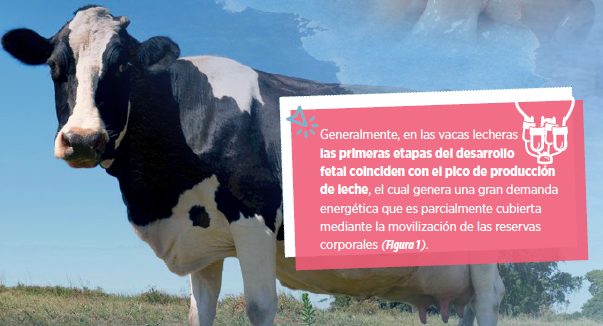
In recent decades, milk production has increased, partly due to improvements in cow feeding and, in part, due to genetic selection of cows with greater milk yields. These in turn, breed offspring that manage to exceed maternal production (Berry et al., 2008).
| Due to the effect of fetal programming, development will not be the same for an individual bred in an environment with an adequate supply of nutrients, than that of a fetus whose mother is producing high volumes of milk or has poor nutrition |
Berry et al. (2008) suggest that prenatal conditions experienced by the bovine fetus could affect the animal’s productive performance and health as an adult.
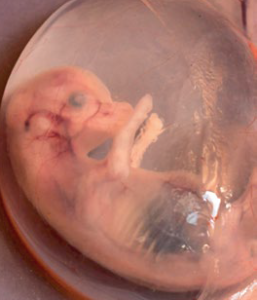
Figure 1. Milk production curve
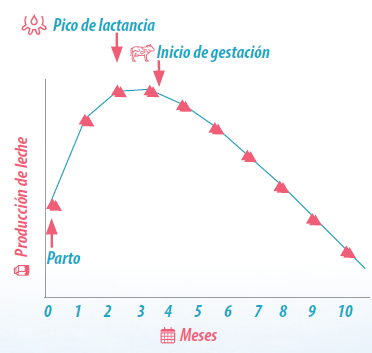
![]() It has been described that the morphogenesis of the mammary gland begins during fetal development and continues during puberty, pregnancy and successive lactations with their involutions (Rijnkels et al., 2010). These morphogenic changes can be affected by the conditions faced by the fetus inside the womb (Berry et al., 2008). [register]
It has been described that the morphogenesis of the mammary gland begins during fetal development and continues during puberty, pregnancy and successive lactations with their involutions (Rijnkels et al., 2010). These morphogenic changes can be affected by the conditions faced by the fetus inside the womb (Berry et al., 2008). [register]

![]() The purpose of this study was to evaluate what effect does fetal programming generate in the offspring’s first lactation:
The purpose of this study was to evaluate what effect does fetal programming generate in the offspring’s first lactation:
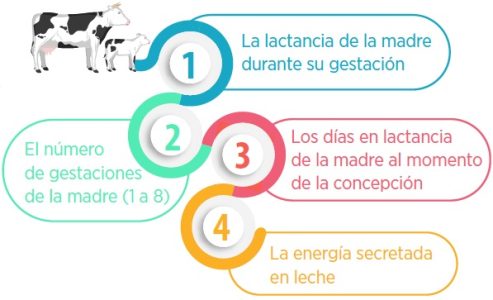
Materials and methods
A retrospective study was carried out with a database that has productive and reproductive records of lactations reported by 1131 dairy farms in the Province of Buenos Aires (Argentina) between 1981 and 2011. These production units are members of ARPECOL (Association of Pampas Regional Dairy Control Entities).
For each lactation, the accumulated milk production at 150 days in milk (DIM) was calculated using the trapezoid formula. In order to make a valid comparison between lactations, the value of milk liters in each registered milk control was standardized to 3.5% GB.
As a reproductive indicator, the breeding interval (BI), expressed in days, was calculated and the quartiles were estimated:
![]() Quartile 1 <77 DIM
Quartile 1 <77 DIM
![]() Quartile 2 between 77 and 115 DIM
Quartile 2 between 77 and 115 DIM
![]() Quartile 3 between 116 and 190 DIM
Quartile 3 between 116 and 190 DIM
![]() Quartile 4 >190 DIM
Quartile 4 >190 DIM
Therefore, the analyzed lactations where those in which productive and reproductive indicators could be calculated (73,921 mothers, 84,749 lactations). As well as the successive lactations of female offspring born in the lactation being considered(85,019 daughters).
Results

The accumulated milk production at 150 Days in milk of the daughters decreased quadratically as the number of pregnancies of the mother increased (P <0.01, Figure 2).
 The daughters of first-time heifers produced about 36 liters more than the daughters of cows with 2 pregnancies.
The daughters of first-time heifers produced about 36 liters more than the daughters of cows with 2 pregnancies.
 Females bred after 150 days in milk produced more than those that were conceived on average on days 100 and 50. From 150 DIM there were no significant differences in milk yield(Figure 2).
Females bred after 150 days in milk produced more than those that were conceived on average on days 100 and 50. From 150 DIM there were no significant differences in milk yield(Figure 2).
 Finally, the energy secreted in milk had no effect on the accumulated production of the daughters up until 150 days(P >0,1).
Finally, the energy secreted in milk had no effect on the accumulated production of the daughters up until 150 days(P >0,1).
Figure 2. Accumulated milk production in 150 d for heifers born from the first to the eighth gestation
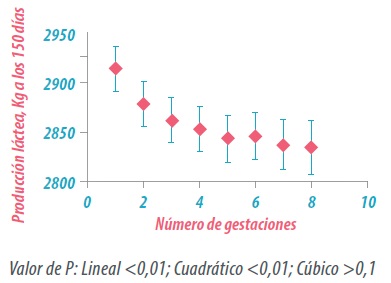
Figure 3. Milk production from heifers wich were conceived at 50, 100, 150 or more than 150 days in milk
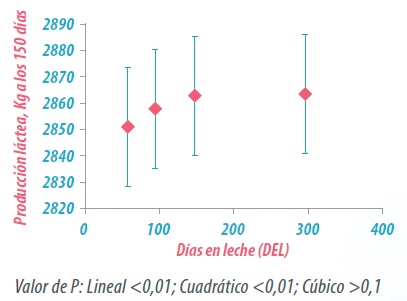
Discussion
This study showed that females which were conceived in the absence of lactation produced more milk during their first lactation than those whose mothers were lactating at the time of conception.
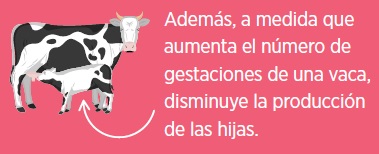
Those calves gestated during the mother’s lactation, compete with the mammary gland for nutrients. This does not allow them to receive the necessary nutrient supply for their normal development.
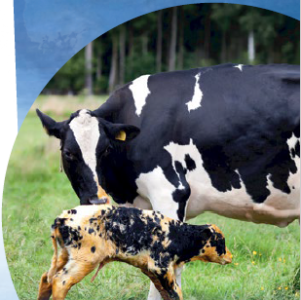 A cow’s ability to gestate a calf is dictated by the way in which it distributes nutrients for sustaining the development of the fetus and milk production or its own growth (Banos et al., 2007).
A cow’s ability to gestate a calf is dictated by the way in which it distributes nutrients for sustaining the development of the fetus and milk production or its own growth (Banos et al., 2007).
Evidence from this study may suggest that nutrient supply for the fetus is more limited in the lactating cow compared to a heifer which continues to grow.
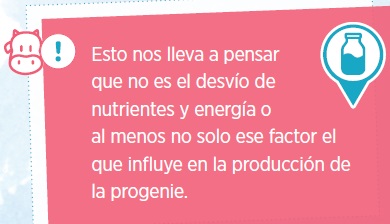
Probably, the fact that primiparous mothers breed offspring with better yields is due to the fact that gestation takes place in an intact uterine environment. With no previous effects of past births including potential bacterial contamination.
Gonzalez-Recio et al. (2012) showed that females which were conceived by non-lactating cows had a longer productive lifespan than those whose mothers were lactating. In addition to this, the protein and fat concentration of milk was higher in firstborns.
Conclusions
![]() It is clear then that the physiological and metabolic state in which the the cow finds itself during gestation has great impact on the calf’s productive life, and therefore fetal programming is crucial.
It is clear then that the physiological and metabolic state in which the the cow finds itself during gestation has great impact on the calf’s productive life, and therefore fetal programming is crucial.
![]() In this sense, the production of mothers doesn’t seem to be as important, as are the number of previous pregnancies, and days in milk at the time of conception.
In this sense, the production of mothers doesn’t seem to be as important, as are the number of previous pregnancies, and days in milk at the time of conception.
![]() This study provided no evidence of potential genetic changes in fetuses related to the age of mothers. It would be interesting and important for future studies to address this hypothesis.
This study provided no evidence of potential genetic changes in fetuses related to the age of mothers. It would be interesting and important for future studies to address this hypothesis.
[/register]
Subscribe now to the technical magazine of animal nutrition
AUTHORS

Hybrid Rye Potential in Laying Hen Feed Rations
Gwendolyn Jones
A day in the life of phosphorus in pigs: Part I
Rafael Duran Giménez-Rico
Use of enzymes in diets for ruminants
Braulio de la Calle Campos
Minerals and Hoof Health in the Pregnant Sow
Juan Gabriel Espino
Impact of Oxidized Fats on Swine Reproduction and Offspring
Maria Alejandra Perez Alvarado